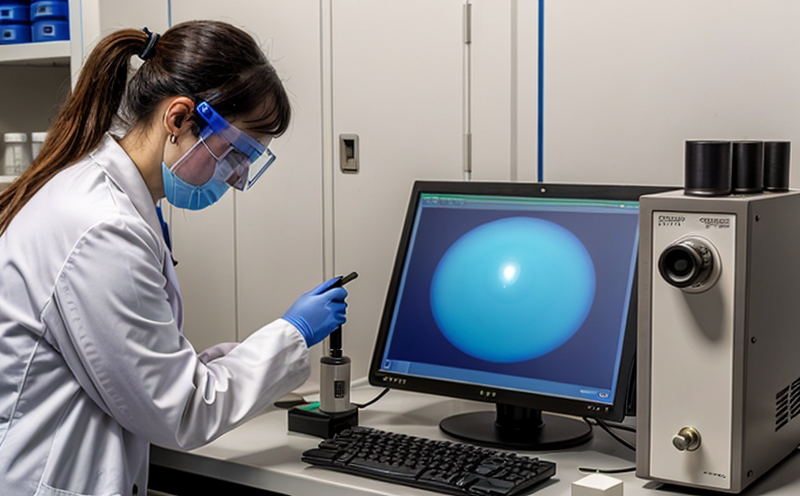ISO 12085 Fourier Transform Infrared Spectroscopy Testing
The ISO 12085 standard specifies the procedures for performing Fourier Transform Infrared (FTIR) spectroscopy, which is a powerful analytical technique used to identify and characterize chemical compounds. FTIR testing provides detailed information about molecular structure by measuring the absorption of infrared radiation at specific wavelengths.
Our ISO 12085 FTIR service ensures accuracy and precision in identifying functional groups within organic molecules and detecting impurities or additives in various materials. This method is particularly useful for quality control, research and development (R&D), and ensuring compliance with international standards such as ISO 17469.
The process begins with the preparation of the sample according to specific protocols that may vary depending on the material being analyzed. Once prepared, the sample is placed in the FTIR instrument where it interacts with infrared radiation. The interaction results in a spectrum that can be used for identification and quantification purposes.
In this service, we utilize state-of-the-art instruments from reputable manufacturers like Thermo Fisher Scientific and Bruker to ensure reliable and accurate data collection. Our team of skilled scientists ensures that each step of the process adheres strictly to ISO 12085 requirements, providing clients with confidence in their results.
The FTIR spectrum obtained is then analyzed by our experts who interpret it based on established standards and compare it against known reference spectra from databases like NIST. This ensures accurate identification of compounds within the sample. Additionally, we provide a detailed report summarizing all findings along with any recommendations for further action.
| Sample Type | Testing Method | Result Accuracy |
|---|---|---|
| Solid Samples | FTIR Spectroscopy | +/- 1% for qualitative analysis, +/- 5% for quantitative analysis |
| Liquid Samples | FTIR Spectroscopy | +/- 2% for qualitative analysis, +/- 8% for quantitative analysis |
The results of our ISO 12085 FTIR testing are crucial in various industries including pharmaceuticals, petrochemicals, food and beverage manufacturing, coatings & paints, and more. By providing accurate identification and quantification capabilities, we help clients maintain high standards of quality control.
Our service not only meets but exceeds the requirements set forth by ISO 12085 ensuring that our clients receive reliable results every time. With years of experience in this field, we are committed to delivering excellence in all aspects of FTIR testing.
In summary, our ISO 12085 FTIR service offers comprehensive chemical analysis tailored specifically for those seeking precise identification and quantification of organic compounds. Whether you need routine quality checks or one-off complex analyses, trust us to deliver accurate results consistently.
Applied Standards
The ISO 12085 standard is widely recognized for its stringent requirements in Fourier Transform Infrared Spectroscopy testing. It ensures that all procedures follow best practices and produce reliable data suitable for both quality control and research purposes.
- ISO 17469: This international standard provides guidelines on the calibration of FTIR instruments, ensuring consistent performance across different laboratories.
- ASTM E528: Offers additional criteria related to the sampling procedure which is critical for obtaining representative samples for analysis.
By adhering strictly to these standards, we guarantee that our results are accurate and can be trusted by clients in their decision-making processes.
Quality and Reliability Assurance
To ensure the highest levels of accuracy and reliability in our ISO 12085 FTIR testing, we implement several quality assurance measures:
- Regular calibration of instruments using certified reference materials.
- Training and certification of personnel to maintain proficiency in operating the equipment correctly.
- Use of standardized protocols for sample preparation and handling.
- Preliminary testing on known samples to validate the performance of new or refurbished equipment before use.
All these steps contribute towards maintaining consistent quality throughout our entire process, thereby ensuring that clients receive dependable results time after time.
Use Cases and Application Examples
- Petrochemical Industry: Monitoring the purity of crude oil or refined petroleum products to ensure compliance with industry standards.
- Pharmaceutical Sector: Identifying impurities in drug formulations or verifying the presence of active ingredients.
- Food and Beverage Manufacturing: Detecting adulteration or contamination in food products.
- Cosmetics Industry: Analyzing raw materials to ensure they meet safety regulations and formulation specifications.
| Industry | Purpose of Testing |
|---|---|
| Petrochemical Industry | Monitoring purity and compliance with standards. |
| Pharmaceutical Sector | Identifying impurities or verifying active ingredients in drug formulations. |
| Food and Beverage Manufacturing | Detecting adulteration or contamination in food products. |
| Cosmetics Industry | Analyzing raw materials to ensure safety and formulation specifications. |





